If only this new national security episode was not bringing so much grief to so many, the experience might be appreciated as a kind of misdirected comic interlude: ancient concepts of justice, reinforced by the strictures of Leninist dictatorship, imposed on a Westernized 21st century city in the name of national security, administered by bewigged common law judges still in their British-style courtroom attire.
These scenes follow from Beijing’s promulgation of a National Security Law for Hong Kong on June 30 last year and all that has happened since. Decades of work that went into the building of a new post-colonial society have been upended in just a few months.
But the finishing touch was provided by Hong Kong’s police force on April 15, recently designated as China’s National Security Education Day.
Why the People’s Liberation Army should have chosen to adopt the old Nazi-style goosestep for their parade ground formations is for them to explain. Since Hong Kong has no army, it fell to the police force to do the honours on April 15. But, presumably, Hong Kong’s finest had the option of avoiding this particularly humiliating means of demonstrating their patriotic devotion to duty on April 15
A new political order in the making
Next into the spotlight will be the key players in a a prolonged election season, as Hong Kong sets about trying to implement the unique designs that national leaders in Beijing have just decreed to replace the old post-colonial system. It had been in place since Hong Kong’s 1997 transfer from British to Chinese rule.
That system was originally designed by Beijing in the late 1980s, with an eye to keeping Western-style democracy at bay. This objective has never been articulated in so many words but seems a logical conclusion to draw after the long-running struggle with Beijing over “genuine” universal suffrage elections, which Hong Kong democrats have just lost.
The new electoral system makes a mockery of that struggle and is best characterised as another episode in the unfolding series of mismatched initiatives being decreed from on high.
The new variant was formalised in amendments to Annex One and Annex Two of Hong Kong’s original Basic Law. This was drafted in the late 1980s, under Beijing’s direction, to serve as Hong Kong’s post-1997 constitution. The amendments were promulgated by China’s current paramount leader Xi Jinping on March 30, this year.

The latest format may be too arcane to follow at first glance, but its purpose is easily understood. The new convoluted design differs from its predecessor, which still allowed pro-democracy partisans to aim for a majority in Hong Kong’s 70-seat legislature.
The official aim now is to close all the “loopholes” that allowed such hope to take hold. They have been closed in order to try and ensure that only safe pro-Beijing loyalists and their companion pro-establishment conservatives emerge victorious, and pro-democracy partisans win as few seats as possible.
Conventional democrats, as we have come to know them, will be lucky to capture a dozen seats in the new 90-seat Legislative Council. Probably, only some new moderate varieties will make it past the vetting gate and be allowed to contest. Until now, the few who attempted this “third way” route have barely managed to win honourable mentions at the polls.

Cast out into the wilderness, democrats must search for survival strategies that will allow them to preserve the memory of their defeated movement and the precedents they set, along with the hope of some future revival.
Their memories also include a consistent majority advantage (roughly 60:40) in territory-wide voter preference best measured in terms of the Legislative Council’s directly elected seats.
The official designation for their adversaries is “patriots.” During a February 22 keynote speech explaining the term and Beijing’s objectives ahead of the electoral reform roll-out on March 30, leading Beijing official Xia Baolong spoke in terms of the Communist Party’s basic governing principles.
Patriots are committed to upholding China’s national sovereignty, security, and development, said Xia. Patriots are also committed to China’s centralised governing system and Hong Kong’s place within it. And they are committed to upholding Hong Kong’s prosperity and stability.
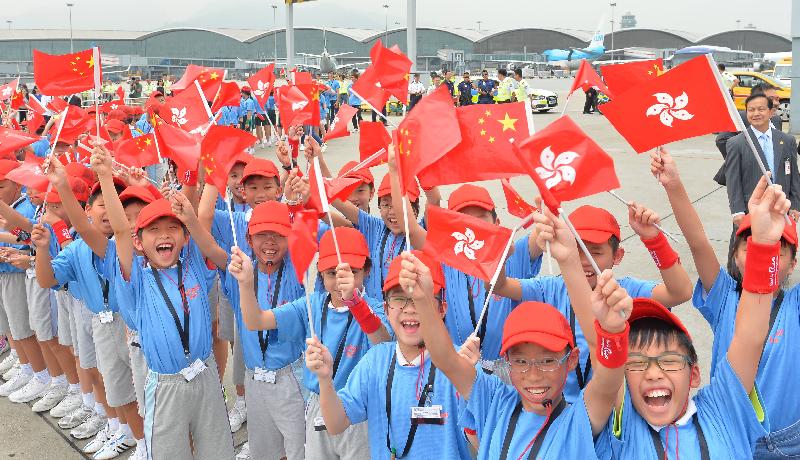
In practical terms, Hong Kong patriots can be counted on to accept Beijing’s decision-making authority, whether by reason of genuine commitment or conventional self-interest. It is this coalition of pro-Beijing loyalists and pro-establishment conservatives, including old-style communist adherents, conservative nationalists, and new-style capitalist entrepreneurs, who have been handed the keys to Hong Kong’s government.
This is the coalition that must now try and fulfil Beijing’s mandate, namely, to ensure that Hong Kong’s seven million inhabitants can enjoy a “normal” life, after years of political agitation and dissent. The next question is whether this coalition can survive in its new starring role as the saviour of Hong Kong, guardian of its prosperity, and leader of a divided community.
Who are they?
They include familiar faces and intimations of new arrivals on the Hong Kong political scene who have even closer ties to Beijing. The familiar local faces have been political players in Hong Kong for decades and their number one drawback has always been reflected in their inability to overcome the Hong Kong voting public’s preference for democrats.
Still, loyalists and conservatives did prevail at the neighbourhood level where democrats could not — or did not want to – compete with the resources their adversaries devoted to Hong Kong’s 18 District Councils. These are primarily concerned with local amenities.
Pro-establishment candidates dominated at this level, until 2019, when they could not defend their turf against the upsurge of public anger created by Chief Executive Carrie Lam’s attempt to force passage of her feared extradition law.
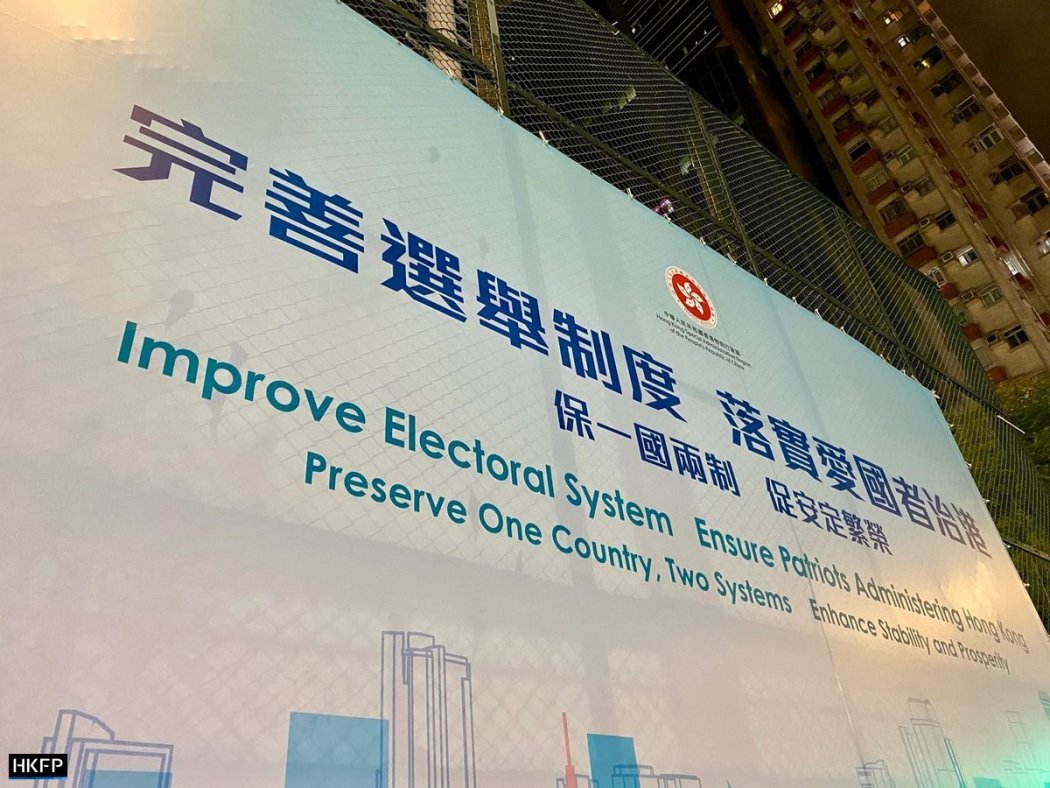
Nevertheless, in terms of actual votes cast, the 60:40 pattern held even then. Democrats won more seats because, for once, they cared enough about the political importance of the District Councils poll to campaign as a team and refrain from competing against each other.
Most prominent among the familiar loyalist faces are the politicians who have been contesting elections here since the 1990s. These politicians have two large powerful organisations supporting them, with unlimited resources to fund candidates and an unlimited supply of campaign workers to canvass for votes at election time.
These candidates also enjoy the benefits of coordinated leadership to guide election strategies citywide and especially to enforce discipline. Any hint of candidates tempted to compete with each other in any given constituency is nipped in the bud immediately, usually before it comes into public view.
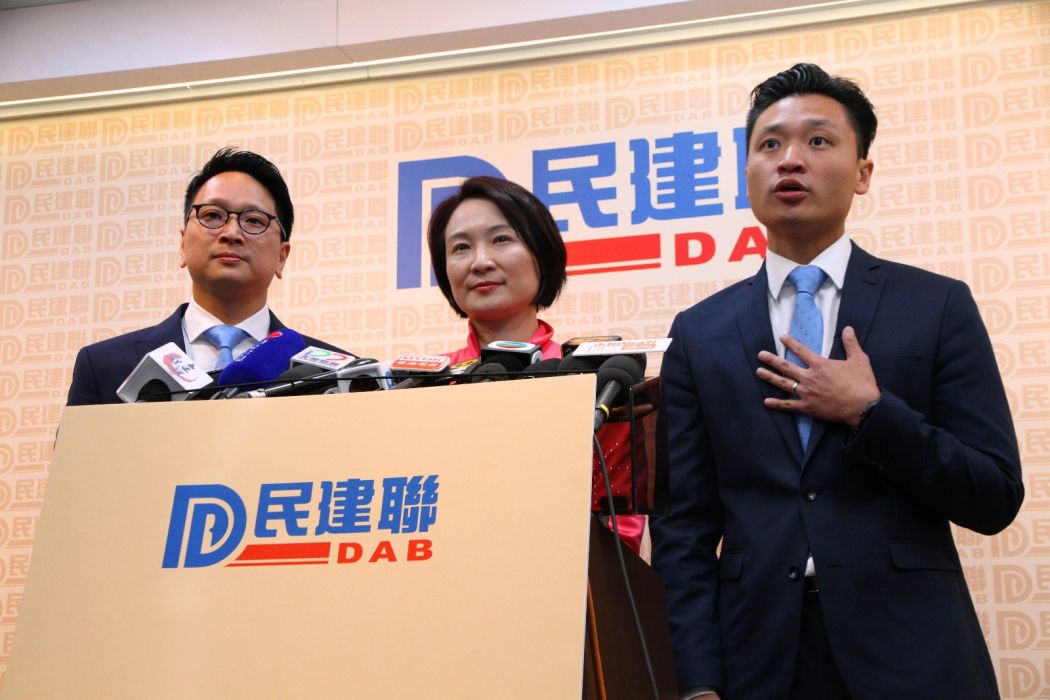
The organisations are a political party and a trade union that doubles as a party and fields candidates at election time. The Democratic Alliance for the Betterment and Progress of Hong Kong (DAB) was founded in 1992 and grew rapidly into a mass-based organisation, much like its Communist Party mentor.
The DAB merged with the small pro-business pro-Beijing Hong Kong Progressive Alliance, in 2005. This merger signified the effort to smooth over the division between Hong Kong’s original true loyalist post-1949 patriotic community, and its new post-1997 “opportunistic” pro-business conservative allies.
Now claiming 44,000 members, the DAB is Hong Kong’s largest political party by far. Even before the current “national security era” exodus began, pro-democracy parties have been able to boast only a few hundred members at most.

The Federation of Trade Unions (FTU) was established by pro-Communist labor union activists in 1948, and pre-dates the founding of the People’s Republic itself. Besides providing a sense of worker solidarity and social services for its members, the FTU was also a source of political activism and agitation, culminating in the mid-1960s riots.
Since then, the FTU has settled into a more conventional posture and can now claim 250 affiliated trade unions with a combined membership of about 400,000 including both blue- and white-collar workers. They complement the DAB’s orientation as a party for middle-class middle-income pro-Beijing loyalists.
The Chinese Communist Party’s local branch remains “underground” and there is as yet no hint of its surfacing under Hong Kong’s new national security order. Presumably, there is some concurrent overlap with the ranks of leading DAB and FTU members.

Other much smaller parties at this end of the spectrum — pro-Beijing, pro-business conservative — are the Liberal Party, former civil servant Regina Ip’s New People’s Party, and a Liberal Party breakaway, the Business and Professionals Alliance. So, there is something for everyone in this assortment.
The DAB holds 13 seats and the FTU five in the Legislative Council (LegCo), currently sitting in extended session. The council is also minus all but two members of the original pro-democracy caucus elected in 2016. Most disappeared after the final disqualification/resignation wave struck last November.
The regular four-year term is continuing without them for an extra year, until this December, when the new arrangements will be in place. The election was originally scheduled for September 2020.
Three DAB members also sit on Chief Executive Carrie Lam’s advisory Executive Council and the party has become a source of talent tapped to fill some leading administrative positions as well.
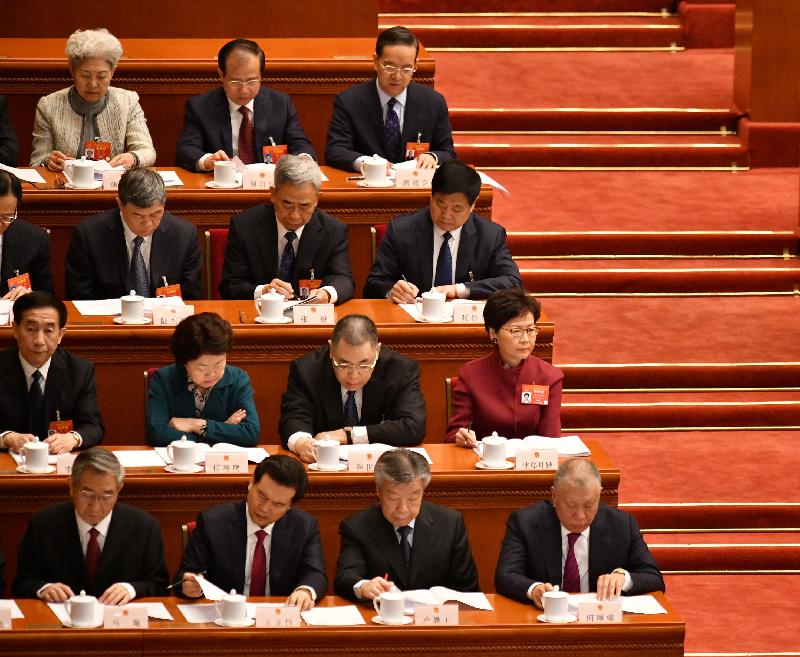
Additionally, five DAB members are among Hong Kong’s 36-member National People’s Congress (NPC) delegation. The party is also well represented among the 124 Hong Kongers whose contributions in various lines of endeavour have qualified them for appointment to the national committee of the honorary Chinese People’s Political Consultative Conference (CPPCC).
Democrats do not appear anywhere in this line-up, except for the few who have made a clean break from their past political lives. Some tried to join the first NPC delegation to be selected after Hong Kong’s return to Chinese rule, in late 1997. They were quickly shown the door and soon abandoned this means of cross-border proselytizing for democracy.
Similarly, pro-Beijing politicians generate little bipartisan interest or even name-recognition in the wider community. The DAB’s founding chairman Jasper Tsang Yok-sing is one of the few with a wider following. His more open and tolerant manner puts many moderate Hong Kongers at ease — and sets him apart from most others in the DAB-FTU coalition.
Rubber stamps, loyalist rubbish and a new political party
The newcomers entering this scene are getting off to a rough start. It suggests that pro-Beijing patriotic politicians now with the stage all to themselves might — if left to themselves – become as faction-ridden as their erstwhile democratic opponents had always been, at least until 2019.

But presumably, the same disciplined coordination will soon be imposed on all alike, although perhaps not with quite as much success as when the DAB, FTU, and their pro-business allies knew they were fighting from a minority position and had to work together or go down to certain defeat.
In those days, the pro-establishment camp’s best weapons were their FTU get-out-the-vote campaign teams and bad weather on Election Day. The teams would be out rain or shine. Pro-democracy voters were less well-disciplined.
The newcomers are from a newly designated category known as the “new Hong Kongers,” or post-1997 cross-border migrants. They are allowed entry at the rate of 150 per day and now amount to something just over 10 per cent of Hong Kong’s total population.
But among these migrants, the key players are value-added mainlanders with overseas education, professional experience, and big bank balances. They feature in the new Bauhinia Party, launched last year with a splash of publicity and something less than an enthusiastic welcome from its prospective local allies.
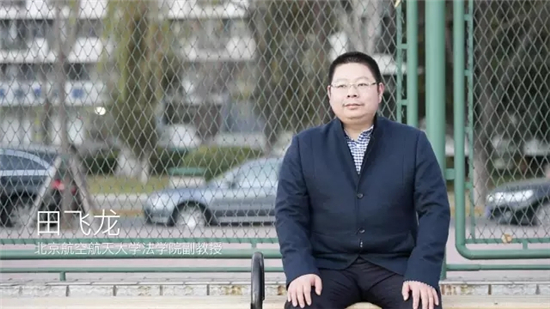
Matters were made worse when a Beijing academic who specializes in Hong Kong affairs seemed to dismiss all of its pro-Beijing politicians as “rubber stamps and loyalist rubbish.” The academic is Tian Feilong, a law professor at Beihang University in Beijing, who comments frequently in the Hong Kong press as a champion of the new order.
Interviewed by the New York Times shortly after the National Security Law was promulgated last summer, Tian recalled that in his student days he, too, had been attracted to the liberal ideas then circulating among China’s intellectuals. They were the same ideals reflected in Hong Kong’s democracy movement that he witnessed as a visiting scholar here a few years ago.
Now in his late 30s, his views had realigned right on cue to dovetail with those of the Xi Jinping era. China is ascending and America is in decline. Chinese statecraft in this era is all about order, authority, and power.
But as an intellectual commentator on Chinese Communist-led government and politics, Tian is supposed to be in the business of creating favorable public opinion for official policies and initiatives. Or perhaps Beijing has decided that in this era, a “tough love” approach is the way to go because Hong Kong’s post-colonial loyalist politicians are badly in need of a more disciplined mainland-style approach to their work.
Tian’s reference to rubber stamps and loyalist rubbish appeared in a lengthy commentary published in Hong Kong’s Chinese-language Ming Pao Daily on March 3. His essay celebrated what he called the historic “constitutional moment” about to occur with the promulgation of amendments on electoral reform to Hong Kong’s Basic Law constitution.

Explaining what would henceforth be expected of moderate democrats (radicals to be excluded), he said they didn’t have to love the Communist Party because they were not party members. But they must respect its authority as the unassailable ruler of China and leader of its government.
Loyalists, for their part, should upgrade. They needed a responsibility system. Those who failed to serve well should step down because Beijing’s doesn’t want “rubber stamps and loyalist rubbish.”
Mostly, they let the insult pass — except for long-time loyalist Ip Kwok-him, who is a member of Hong Kong’s NPC delegation. He said it was wrong to use such derisive words because others might respond in kind and call Tian a “rubbish scholar.”
Or they might dismiss him as just another arrogant Beijing intellectual, of the kind that were pilloried back in the old revolutionary days for talking down in the old-fashioned way to small-time provincial powerholders.
Undeterred, Tian later accused them of “double dealing,” or trying to accommodate by playing both sides of the political aisle instead of taking the strong stand expected of them as pro-government legislators.

Enthusiastic loyalist Legislative Councilor Junius Ho is a model in that respect. He never accommodates and hastened to defend Tian by naming names. Tian was saying some things that needed to be said, wrote Ho and co-author K.T. Chan in China Daily on April 30.
They singled out pro-establishment brothers James and Michael Tien, who have been well-rewarded by Beijing over the years. Both were wobblers. In 2019 Michael had declared his opposition to Chief Executive Carrie Lam’s extradition bill, in response to the growing public backlash against it. And long ago, in 2003, it was James who led his Liberal Party colleagues to withdraw support for Chief Executive Tung Chee-hwa’s Article 23 national security legislation.
Some of these legislators also failed to support the national patriotic education curriculum in 2012. Nor did they appreciate the danger inherent in the liberal studies curriculum that has just succumbed to the strictures of the new national security era.
All such lacklustre pro-establishment politicians should hold themselves responsible for the undisciplined unpatriotic behaviour of Hong Kong’s young people in 2014 and 2019, and all the agitation in-between.
How the new Bauhinia Party — named after Hong Kong’s official flower — will adapt to these long-standing controversies is difficult to divine since its leaders have yet to say. To date, they can best be described as press conference politicians with high ideals, an ambitious agenda and little else, even though their first test is fast approaching.
The selection process for the all-important Election Committee, centrepiece of Hong Kong’s new election system, is scheduled for this coming September. The Legislative Council election follows in December.
Chief spokesman is Charles Wong Chau-chi, who introduced the party last December. In an SCMP interview, he said Hong Kong’s existing pro-establishment parties were stagnating and its government was running about like a “headless chicken.” By this he meant indecisive and directionless.
Given this introduction, candidate cooperation and coordination between old and new loyalists may be difficult but Wong seems undaunted by the challenges ahead. As of last December, the party’s plans included the creation of a political training centre, a think tank to conduct opinion surveys to assess public opinion better, and an eventual membership of 250,000.
Wong sidestepped the question of association with Hong Kong’s underground Communist Party branch and indicated that Beijing’s Hong Kong Liaison Office was also not behind the project.
He said the idea for the new party came from its founding members themselves. They were inspired by the 2019 protests and the need for a more determined effort to solve the economic and social issues that were the root cause of such disorder.
Toward that end, the new party hopes to work with the existing pro-establishment parties, not supplant them, and sees itself as a platform for all Hong Kongers, not just new mainland migrants.
In a later HKFP interview, he mocked the call for universal suffrage elections, claiming it was just a slogan, and in any case did not represent the majority view, which he aimed to represent.
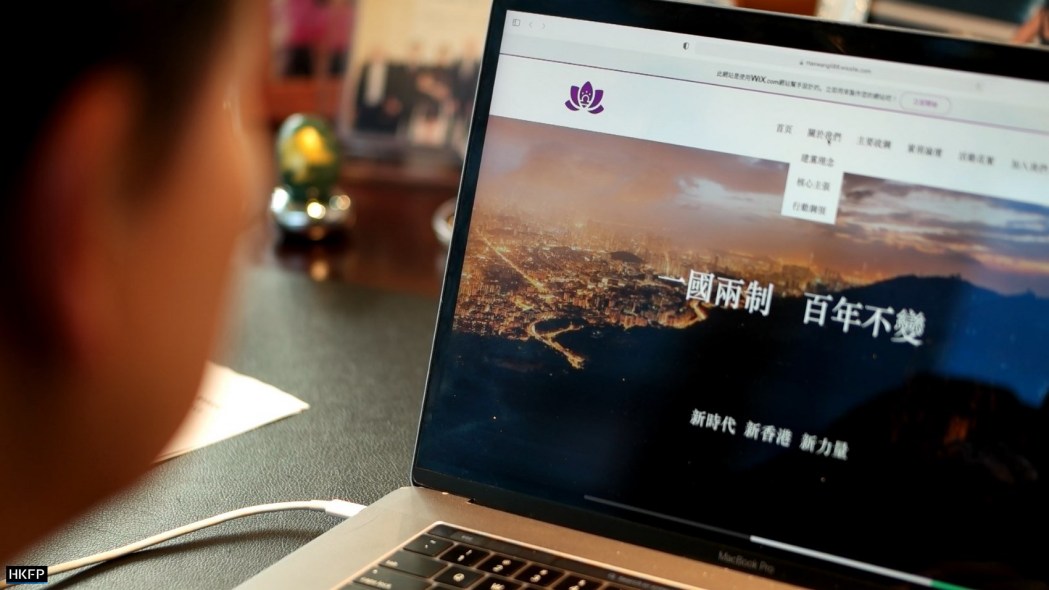
Including Wong, the party’s co-founders are its chairman Li Shan and Chen Jia-wen. All are business executives: in the media, banking, and cosmetics industries, respectively.
Introducing himself during a talk at the Foreign Correspondents Club in late February, Li Shan claimed he had no knowledge of Beijing’s impending plans for a major overhaul of Hong Kong’s electoral system.
But in light of the new system’s design, announced a month later, the Bauhinia Party seems tailor-made for business and industry sector representation, in the Functional Constituencies. Or better yet, the party can look forward to direct entry via the large number of new Election Committee-appointed seats — 40 among the new expanded LegCo, which will have a total of 90 seats, up from 70.
So, the new party doesn’t need to worry about competing with the DAB and FTU out on the campaign trail. There are now plenty of extra seats to go around and lobbying can all be conducted behind closed doors.
Support HKFP | Policies & Ethics | Error/typo? | Contact Us | Newsletter | Transparency & Annual Report | Apps
Help safeguard press freedom & keep HKFP free for all readers by supporting our team
| HKFP is an impartial platform & does not necessarily share the views of opinion writers or advertisers. HKFP presents a diversity of views & regularly invites figures across the political spectrum to write for us. Press freedom is guaranteed under the Basic Law, security law, Bill of Rights and Chinese constitution. Opinion pieces aim to point out errors or defects in the government, law or policies, or aim to suggest ideas or alterations via legal means without an intention of hatred, discontent or hostility against the authorities or other communities. |

More HKFP OPINION:
HKFP has an impartial stance, transparent funding, and balanced coverage guided by an Ethics Code and Corrections Policy.
Support press freedom & help us surpass 1,000 monthly Patrons: 100% independent, governed by an ethics code & not-for-profit.












